Online shopping can be a lot. With countless deals and endless hours of research you can do before buying, it can quickly turn into a full-time job.
In fact, 54% of shoppers surveyed say when shopping online, they visit multiple websites before settling on what to buy and who to buy it from. This creates a major challenge for online merchants: how to keep shoppers on their site without losing them to external research.
.png?width=450&height=256&name=The%20Challenge%20-%20too%20much%20research%20(2).png)
AI shopping assistants are proving to be a powerful solution. They help shoppers find the information they need quickly, while helping online retailers sell more.
In this guide, we’ll explore:
- What AI chatbots and shopping assistants are and how they streamline the shopping experience
- How they boost retailer engagement and conversions
- Steps to set up alby’s AI shopping assistant
- How AI shopping assistants and chatbots are reshaping customer expectations
What are AI Shopping Assistants?
AI shopping assistants are designed to replicate the in-store shopping experience by providing immediate, personalized support—much like how a store attendant would assist you in person.
Powered by conversational AI, these tools can understand shoppers’ questions and provide instant information. AI shopping assistants can provide shoppers with different types of information, including:
- Product recommendations
- Sizing information
- Styling advice
- Customer service support
- Shipping and return policies
- Personalized promotions
The most common type of shopping assistant is the AI chatbot. These usually appear in the bottom right corner of a website, prompting shoppers with messages like "Ask a question" or "How can I help you?" Customers can ask questions and engage in a conversation with the chatbot.
According to a survey put out by Tidio, 88% of shoppers have interacted with an AI chatbot in some form.
However, new forms of AI shopping assistants are emerging, particularly in response to some critiques of traditional chatbots. For example, alby (us!) offers an embedded widget that provides conversational guidance directly on product pages.

AI shopping assistants are rapidly growing in popularity. Let’s explore how these tools are benefiting online retailers.
What Can AI Shopping Assistants Do for Your Store?
Streamline shopping experience for customers
Product research is a crucial step for online shoppers, each with unique needs seeking specific information. However, retailers often struggle to manage what information to include on their websites. Space is limited, and product pages can easily become overwhelming.
AI shopping assistants bridge this gap by offering personalized information dynamically in one central place. This approach streamlines the shopping journey, giving customers a clear and manageable resource to find exactly the information they need.
Drive conversions and sales
AI shopping assistants can act as highly effective sales associates. They educate customers about product benefits, cross-sell and upsell, and keep shoppers engaged on your site.
alby's AI shopping assistant specifically drives conversions through conversion-optimized prompts. Using a proprietary machine learning model, alby identifies which questions are most likely to lead to a purchase. These questions are pre-generated on every product page, guiding shoppers to purchase.
Reduce burden on customer service teams
AI shopping assistant can handle common shopper questions, reducing the workload on customer service teams. This allows them to focus on higher-value tasks and more complex customer needs.
Provide unique shopper insights
AI shopping experiences offer valuable insights into shopper behavior that were previously inaccessible. By monitoring conversations, retailers can pinpoint exactly what information drives customers to make a purchase or abandon their carts.
It's clear these tools provide significant value for retailers. Now, let’s go over how to get started!
Getting Started with AI Shopping Assistants
Setting up these tools is simple. Depending on the AI experience you choose for your site, you will generally follow these broad steps for seamless integration.
1. Connect your product catalog
Most providers (including alby!) can automatically connect with your ecommerce platform, such as Shopify, to access product information.
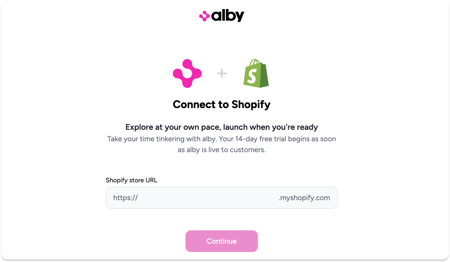
2. Customize the look & feel
You have complete control over the appearance to perfectly match your storefront, including font, color, spacing, and even the option to give your AI sales agent a custom name.
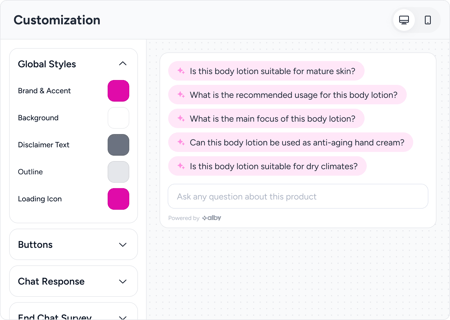
3. Launch on your storefront
That’s it—you’re ready to go live for your shoppers (ideally). Some AI chatbots require building custom flows for various situations or additional configurations.
alby’s AI shopping assistant comes ready to sell right out-of-the-box.
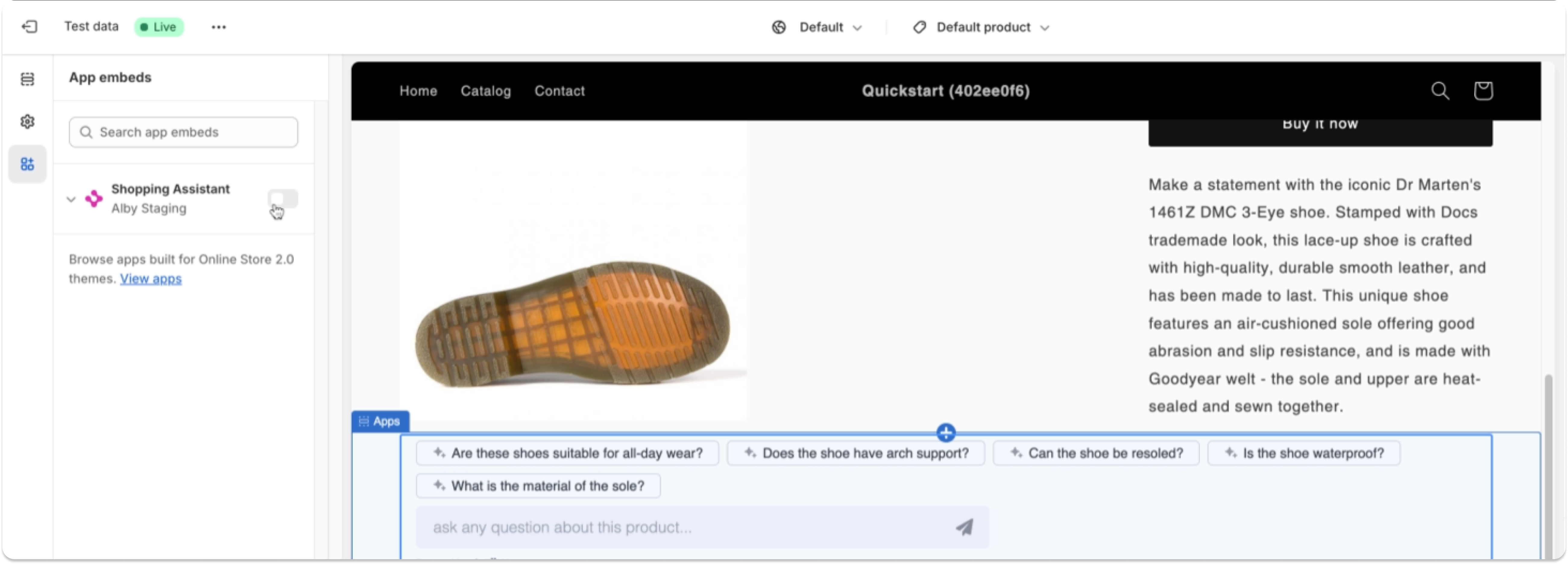
4. Create guardrails
While monitoring conversations, you may encounter situations where you want to set specific "rules" for your shopping assistant to follow.
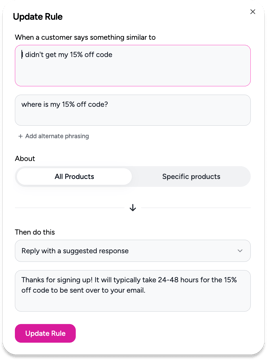
5. Monitor analytics & insights
Monitor the engagement, conversations, and conversions your shopping assistant generates on your site. Gain insights into the questions shoppers are asking.
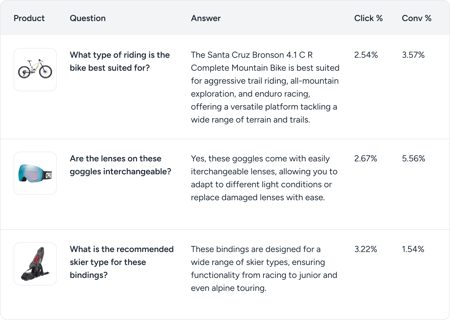
Now, let’s see some AI shopping assistants in action!
AI Shopping Assistants in Action
alby
alby helps brands boost sales by predicting and answering customer questions directly on product pages. For example, sports and outdoor retailer evo uses alby to address technical product questions across all their gear.
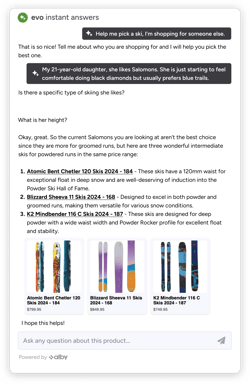
alby delivers real results for businesses, generating $3 million in annual incremental revenue for evo alone. Its capabilities are powerful across various categories, particularly for products that require extensive customer education.
alby's setup is incredibly easy and can provide instant value for retailers.
Amazon's Rufus
Amazon introduced their shopping assistant, Rufus, in early 2024. Rufus is now integrated into various parts of the Amazon experience, from the mobile app chatbot to the embedded desktop interface.
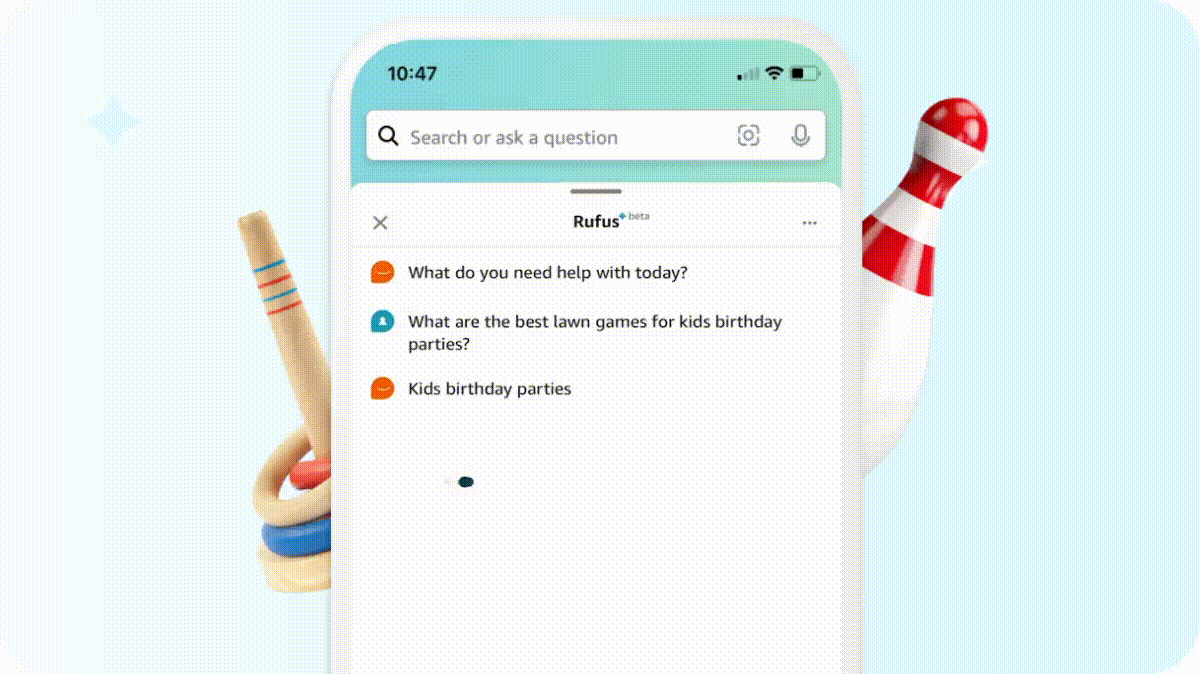
Walmart's Shopping Assistant
In the summer of 2024, Walmart announced the development of its AI shopping assistant, stating that their ultimate “vision is for the GenAI-powered shopping assistant to serve as a trusted shopping companion—helpful, resourceful, and always available—further transforming Walmart from a place to buy items to the first stop for any need or occasion.”
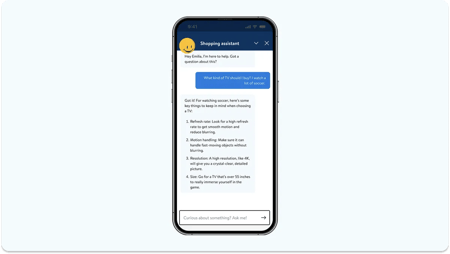
This tool is just the latest example of Walmart's ongoing investment in its digital experience, including significant efforts to leverage generative AI to enhance the overall shopping journey.
Impact on the Ecommerce Industry
With AI chatbots becoming increasingly common across numerous websites, shopper expectations are rapidly evolving. Customers now anticipate instant, personalized assistance during their online shopping experience, making AI-driven support the new standard in ecommerce.
New Shopper Expectations
Shopper expectations are largely shaped by Amazon. With over 200 million shoppers in the U.S. alone, Amazon sets the standard for online shopping experiences.

As AI shopping assistants become a key part of this experience, customers will increasingly expect similar tools to find information on other retail sites. To keep up with the bar set by Amazon, online retailers must explore AI solutions that meet these evolving expectations.
Conclusion
AI experiences—whether sales agents, chatbots, or shopping assistants (whatever you want to call them!)—are transforming online shopping for both customers and retailers. As shoppers increasingly expect instant, personalized support, these tools offer a competitive edge.
By exploring solutions like aby, retailers can deliver a seamless, engaging, and informative shopping experience, driving higher sales and long-term customer loyalty.